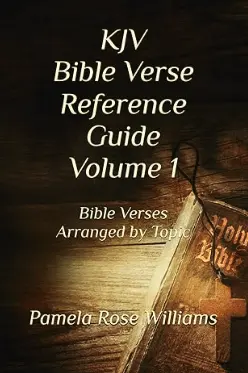The Apocrypha is a collection of 15 books outside of the Bible.
The Bible is composed of 66 books that are the inspired words of God. The Bible is divided into two testaments, the Old Testament (27 books) and the New Testament (39 books). The words of the Bible were written by holy men of God as inspired by the Holy Spirit (2 Timothy 3:16-17). They are the books that have been agreed upon as the Canon by Jews and Christians. The word Canon, which means a rule or measuring device, is from the Hebrew word “qaneh”.
These 66 books of the Bible are widely accepted by God’s people. These books are supported because they are connected directly or indirectly with the prophets and apostles. More about this later.
What is the Apocrypha?
The word apocrypha is a Greek word that means “hidden”. The Apocrypha [1] is a collection of 15 books that were written during the silent period of about 400 years between the Old and New Testaments. The Apocryphal books were translated from the Septuagint which is a collection of Greek manuscripts of the Old Testament and included in the Scriptures of several churches.
It should be noted that these books were not officially accepted by the Roman Catholic Church until 1546 at the Council of Trent long after the Latin Vulgate Bible was published in AD 404. Something else to consider is that Jerome, a Catholic theologian, writer and historian specifically “…differentiated between the Canonical books and ecclesiastical books, which he did not recognize as authoritative Scripture”.[2] Ecclesiastical books are books that are not included in Scripture.
Protestant churches do not consider the Apocryphal books as part of the Hebrew Bible (the Old Testament) because they are not included in the original Masoretic Hebrew Text. This is not to say that the books are to be ignored. Some great historical information can be gleaned from the pages of the Maccabees for example, which relates to the Jewish holy time of Hanukkah.
Finally, because the books were translated to English from different texts some names are spelled differently than what we see in the Hebrew Bible. A complete list of books in the Apocrypha is as follows:
Click here for a table illustration of approximate dates of writing: apocrypha-table-dates
1 Esdras (2nd Century BCE) – This is very much like the Hebrew books of Ezra and Nehemiah combined except stories of Nehemiah have been removed and some other material has been added. Known as the Septuagint translation of the Book of Ezra.
2 Esdras (70-218 CE) – This is an End Time category of books. The author of the book says he is Ezra.
Tobit (225-175 BCE) – This is a story of Tobit, a blind man from Nineveh and Sarah (from Ecbatana), who were Israelites. Tobit has a son named Tobias who was sent by his father to find some money that he left in another city. Tobias is guided to Ecbatana by an angel. He meets Sarah who is saved from a demon by that same angel. They marry and return to Nineveh where Tobias and Sarah learn that Tobit received a miracle that cured his blindness.
Judith (100 BCE) – This is an account of a Jewish widow who charms an Assyrian general who is attacking her city. When he is drunk, she kills him and saves Jerusalem.
Esther (115 BCE) – This is a Greek translation of Esther that adds six sections that are not included in the Hebrew Bible. Though the Hebrew account makes no mention of God, these additional sections mention Him many times.
Wisdom of Solomon (50 BCE) – The main focus in this book is Wisdom and the importance of it. Some believe that the Gospel of John first used the word “Wisdom” to replace the “Word” as seen in John 1:1 “In the beginning was the ‘Word'”.
Ecclesiasticus (Sirach) (200-175 CE) – Though other books of the Apocrypha have unknown authors, this one was written by someone named Jesus, Son of Sirach, whose grandson translated the original Hebrew to Greek. This book centers completely around ethics.
Baruch (200-100 BCE) – This book is theological and was written by a Jewish writer. It contains wisdom about the exiles from Babylon.
Epistle of Jeremiah (317-307 BCE) – In the Roman Catholic Bible this letter is included as the final chapter of Baruch. It is believed to be written by the prophet Jeremiah, and it was written to the Jewish people who were captives in Babylon. Many believe Jeremiah did not write this letter. The purpose of the letter is to exhort the Jewish people not to worship the Babylonian gods.
Prayer of Azariah (1st Century BCE) – This book contains Greek additions to the Hebrew book of Daniel. It is broken into three parts – (1) the prayer of Abednego (called Azariah here), (2) the angel in the furnace, and (3) a praise to God for rescue.
Susanna (333-160 BCE) – This book contains Greek additions to the book of Daniel. Susanna is accused by two men of harlotry. As she is about to be killed for her crime, Daniel rescues her by questioning her accusers. The lies are uncovered, and the two liars are killed instead.
Bel and the Dragon (200-100 BCE) – This book contains Greek additions to the book of Daniel. In it the Babylonian king believes that his idol “Bel” is a true god because he eats the food and drink that he leaves every day. Daniel discovers that the food and drink is secretly going to the priests. The king also believes a dragon is a god. Daniel gives the dragon poisonous food to prove he is not a god.
Prayer of Manasseh (1st or 2nd Century BCE) – This is believed to be an actual prayer that was prayed by Manasseh, one of the kings of Judah. In the Hebrew Bible we find Menasseh as the son of Hezekiah. “Manasseh was twelve years old when he began to reign, and reigned fifty and five years in Jerusalem. And his mother’s name was Hephzibah (2 Kings 21:1)”.
1 Maccabees (100 BCE) – This is part one of a story about a revolt at which time the Jewish people were told that they needed to forget everything Jewish and change to the culture of the Greeks, including language.
2 Maccabees (150-100 BCE) – This is part two and the end of a story about a revolt that was led by Judas Maccabeus the victor.
How do we know the Bible is complete?
The Bible is complete without the Apocrypha. Rather than rewrite it here, please refer to the article Can we trust that the Bible is accurate? In that article you can read more about how the original writers knew what to write, what was included, and how we should know they copied it accurately.
What the Bible says about the Bible
As the Bible was being compiled (and it took many years) there were a few things that those putting the Canon together considered. And when we study the Bible, a fundamental rule of study is to let the Bible prove the Bible. Consider this:
Jesus Himself identified what the Scriptures are:
Jesus said that all of Scripture is included in the law of Moses, and in the prophets, and in the psalms (Luke 24:44). In fact, Jesus quoted from the Old Testament more than 60 times.[3] Since the Scriptures that Jesus spoke of were written before that 400-year gap between the Old Testament and the New Testament, He never quoted from the Apocryphal books.
Jesus also stated for the record the order (at that time) of the Hebrew Old Testament books by mentioning the first murder that was at the beginning of the Old Testament (Genesis) and the last murder that was at the end of the Old Testament (2nd Chronicles) (Matthew 23:34-36). The Christian Old Testament continues to contain all of the books that were in the Hebrew Bible, though the order of the books is slightly different today.
The books that are chosen were characteristic of God Himself
Since God stands behind these books and they are His words, we should expect that they reflect His character. God is holy so His Word is without error and contradictions.
Numbers 23:19. “God is not a man, that he should lie; neither the son of man, that he should repent: hath he said, and shall he not do it? or hath he spoken, and shall he not make it good?”
Psalms 12:6-7. “The words of the LORD are pure words: As silver tried in a furnace of earth, purified seven times. Thou shalt keep them, O LORD, Thou shalt preserve them from this generation for ever.”
Psalms 19:8. “The statutes of the LORD are right, rejoicing the heart: the commandment of the LORD is pure, enlightening the eyes.”
Psalms 119:103. “How sweet are thy words unto my taste! yea, sweeter than honey to my mouth!”
Romans 1:20. “For the invisible things of him from the creation of the world are clearly seen, being understood by the things that are made, even his eternal power and Godhead; so that they are without excuse:”
Hebrews 4:12-13. “For the word of God is quick, and powerful, and sharper than any twoedged sword, piercing even to the dividing asunder of soul and spirit, and of the joints and marrow, and is a discerner of the thoughts and intents of the heart. 13 Neither is there any creature that is not manifest in his sight: but all things are naked and opened unto the eyes of him with whom we have to do.
Hebrews 6:18. “That by two immutable things, in which it was impossible for God to lie, we might have a strong consolation, who have fled for refuge to lay hold upon the hope set before us:”
God chose the writers
The books of the Bible were written by prophets and apostles and other holy men of God, and the words were inspired by God (Holy Spirit).
2 Peter 3:2. “That ye may be mindful of the words which were spoken before by the holy prophets, and of the commandment of us the apostles of the Lord and Saviour:”
2 Timothy 3:16-17. “All scripture is given by inspiration of God, and is profitable for doctrine, for reproof, for correction, for instruction in righteousness: 17 That the man of God may be perfect, throughly furnished unto all good works.
Romans 1:2. “Paul, a servant of Jesus Christ, called to be an apostle, separated unto the gospel of God, 2 (Which he had promised afore by his prophets in the holy scriptures,)”
Matthew 5:17-18. “Think not that I am come to destroy the law, or the prophets: I am not come to destroy, but to fulfil. 18 For verily I say unto you, Till heaven and earth pass, one jot or one tittle shall in no wise pass from the law, till all be fulfilled.”
Matthew 10:19-20. “But when they deliver you up, take no thought how or what ye shall speak: for it shall be given you in that same hour what ye shall speak. 20 For it is not ye that speak, but the Spirit of your Father which speaketh in you.”
Luke 24:27. “And beginning at Moses and all the prophets, he expounded unto them in all the scriptures the things concerning himself.”
Luke 24:44. “And he said unto them, These are the words which I spake unto you, while I was yet with you, that all things must be fulfilled, which were written in the law of Moses, and in the prophets, and in the psalms, concerning me.”
God’s people agree about the books
God’s people may not have agreed at first but in the end, because of the discernment of the Holy Spirit, they were united regarding the books that are in the Canon. There is general consensus.
Romans 8:26. “Likewise the Spirit also helpeth our infirmities: for we know not what we should pray for as we ought: but the Spirit itself maketh intercession for us with groanings which cannot be uttered.”
Galatians 5:22-23. “But the fruit of the Spirit is love, joy, peace, longsuffering, gentleness, goodness, faith, 23 Meekness, temperance: against such there is no law.”
2 Peter 1:21. “For the prophecy came not in old time by the will of man: but holy men of God spake as they were moved by the Holy Ghost.”
1 Corinthians 2:14. “But the natural man receiveth not the things of the Spirit of God: for they are foolishness unto him: neither can he know them, because they are spiritually discerned.”
Examples of discrepancies & errors
A good Bible student should see several things stand out when they read the Apocrypha. Using the considerations above, let’s look at a few things.
The Bible warns against divination, yet the Apocryphal book of Tobit encourages it:
Tobit 6:5-7. So the young man did as the angel commanded him; and when they had roasted the fish, they did eat it: then they both went on their way, till they drew near to Ecbatane. 6 Then the young man said to the angel, Brother Azarias, to what use is the heart and the liver and the gal of the fish? 7 And he said unto him, Touching the heart and the liver, if a devil or an evil spirit trouble any, we must make a smoke thereof before the man or the woman, and the party shall be no more vexed.
Leviticus 19:31. “Regard not them that have familiar spirits, neither seek after wizards, to be defiled by them: I am the LORD your God.”
Leviticus 20:27. “A man also or woman that hath a familiar spirit, or that is a wizard, shall surely be put to death: they shall stone them with stones: their blood shall be upon them.”
Micah 5:11. “And I will cut off witchcrafts out of thine hand; and thou shalt have no more soothsayers:”
Galatians 5:19-21. “Now the works of the flesh are manifest, which are these; Adultery, fornication, uncleanness, lasciviousness, 20 Idolatry, witchcraft, hatred, variance, emulations, wrath, strife, seditions, heresies, 21 Envyings, murders, drunkenness, revellings, and such like: of the which I tell you before, as I have also told you in time past, that they which do such things shall not inherit the kingdom of God.”
The Bible teaches that God created the world out of nothing; the Apocrypha teaches differently:
Book of Wisdom. For thy Almighty hand, that made the world of matter without form, wanted not means to send among them a multitude of bears or fierce lions,
Genesis 1:1-2. “In the beginning God created the heaven and the earth. 2 And the earth was without form, and void; and darkness was upon the face of the deep. And the Spirit of God moved upon the face of the waters.
The Apocrypha teaches that Nebuchadnezzar (Nabuchodonosor) was king of Assyria, he was actually king of Babylon:
Judith 1:1. In the twelfth year of the reign of Nabuchodonosor, who reigned in Nineve, the great city; in the days of Arphaxad, which reigned over the Medes in Ecbatane, (Nineve was in Assyria).
2 Kings 24:1. “In his days Nebuchadnezzar king of Babylon came up, and Jehoiakim became his servant three years: then he turned and rebelled against him.”
Daniel 1:1. “In the third year of the reign of Jehoiakim king of Judah came Nebuchadnezzar king of Babylon unto Jerusalem, and besieged it.”
2 Chronicles 36:6. “Against him came up Nebuchadnezzar king of Babylon, and bound him in fetters, to carry him to Babylon.”
Jeremiah 29:3. “By the hand of Elasah the son of Shaphan, and Gemariah the son of Hilkiah, (whom Zedekiah king of Judah sent unto Babylon to Nebuchadnezzar king of Babylon) saying,”
Works equal a sin offering:
Tobit 4:10-11. Because that alms do deliver from death, and suffereth not to come into darkness. 11 For alms is a good gift unto all that give it in the sight of the most High.
Tobit 12:8-10. Prayer is good with fasting and alms and righteousness. A little with righteousness is better than much with unrighteousness. It is better to give alms than to lay up gold: 9 For alms doth deliver from death, and shall purge away all sin. Those that exercise alms and righteousness shall be filled with life: 10 But they that sin are enemies to their own life.
Ephesians 2:8-9. “For by grace are ye saved through faith; and that not of yourselves: it is the gift of God: 9 Not of works, lest any man should boast.”
Titus 3:5-7. “Not by works of righteousness which we have done, but according to his mercy he saved us, by the washing of regeneration, and renewing of the Holy Ghost; 6 Which he shed on us abundantly through Jesus Christ our Saviour; 7 That being justified by his grace, we should be made heirs according to the hope of eternal life.”
Romans 6:23. “For the wages of sin is death; but the gift of God is eternal life through Jesus Christ our Lord.”
How many years were the Jews held captive in Babylon?
Epistle of Jeremiah 1:2-3. Because of the sins which ye have committed before God, ye shall be led away captives into Babylon by Nabuchodonosor king of the Babylonians. 3 So when ye be come unto Babylon, ye shall remain there many years, and for a long season, namely, seven generations: and after that I will bring you away peaceably from thence.
A year is not a generation (Psalms 90:10 The days of our years are threescore years and ten; and if by reason of strength they be fourscore years, yet is their strength labour and sorrow; for it is soon cut off, and we fly away.)
Jeremiah 25:11. “And this whole land shall be a desolation, and an astonishment; and these nations shall serve the king of Babylon seventy years.”
Jeremiah 29:10. “For thus saith the LORD, That after seventy years be accomplished at Babylon I will visit you, and perform my good word toward you, in causing you to return to this place.”
2 Chronicles 36:20-21. “And them that had escaped from the sword carried he away to Babylon; where they were servants to him and his sons until the reign of the kingdom of Persia: 21 To fulfil the word of the LORD by the mouth of Jeremiah, until the land had enjoyed her sabbaths: for as long as she lay desolate she kept sabbath, to fulfil threescore and ten years.”
Daniel 9:1-2. “In the first year of Darius the son of Ahasuerus, of the seed of the Medes, which was made king over the realm of the Chaldeans; 2 In the first year of his reign I Daniel understood by books the number of the years, whereof the word of the LORD came to Jeremiah the prophet, that he would accomplish seventy years in the desolations of Jerusalem.”
Final Thoughts
There is much to consider when you are looking at the Apocrypha. It contains historical accounts and even some enjoyable stories. Protestant churches do not consider the Apocryphal books as part of the Bible because they are not included in the original Masoretic Hebrew Text which is still used by orthodox Jews today. There are also several other things that were considered when deciding whether or not to include these books in the Hebrew Bible. Jesus never quoted nor spoke of any of the Apocryphal books, much of the content of the Apocrypha goes against God’s character, the writers were not inspired by the Holy Spirit and God’s people agree it is not held as authoritative Scripture.
[1] KJV Apocrypha Text Edition Kj530:A. 1983. Cambridge University Press.
[2] “St Jerome and the Canon.” 2024. Justforcatholics.org. 2024. http://www.justforcatholics.org/a108.htm.
[3] Turner, Matt. 2024. “Jesus Quoted the Old Testament: How Many Times & Why It Matters – 2024.” Biblebreathe.com. July 29, 2024. https://biblebreathe.com/how-many-times-did-jesus-quote-the-old-testament/.

Pamela Rose Williams, Founder of Christianity Every Day, is a wife, mother, and grandmother. She and her husband, Dr. Michael L. Williams have served in Christian ministry since 2001. She has Master of Ministry in Biblical Counseling and Bachelor’s in Christian Education degrees. Most of her time is spent as a professional editor and writer, working with many Christian authors and artists. She also uses her extensive experience in information technology providing Christ-centered teaching tools and resources for people all over the world. To learn more about Pamela visit her About page.
















